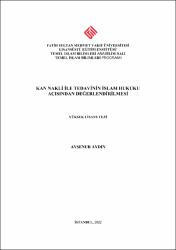| dc.contributor.advisor | Ateş, Üveys | |
| dc.contributor.author | Aydın, Ayşenur | |
| dc.date.accessioned | 2023-04-10T06:45:37Z | |
| dc.date.available | 2023-04-10T06:45:37Z | |
| dc.date.issued | 2022 | en_US |
| dc.identifier.citation | AYDIN, Ayşenur,Kan Nakli ile Tedavinin İslam Hukuku Açısından Değerlendirilmesi, Fatih Sultan Mehmet Vakıf Üniversitesi
Lisansüstü Eğitim Enstitüsü Temel İslam Bilimleri Anabilim Dalı Temel İslam Bilimleri Programı,Yayımlanmamış Yüksek Lisans Tezi, İstanbul 2022. | en_US |
| dc.identifier.uri | https://hdl.handle.net/11352/4499 | |
| dc.description.abstract | Modern tıbbın ilerlemesine paralel olarak ortaya çıkan yeni tedavi metodları birçok dinî ve etik problemi de beraberinde getirmiştir. Modern tedavi yöntemlerinden biri olan kan nakli ile tedavi, gerek kanın İslam hukukuna göre taşıdığı vasıflar gerekse mükerrem olarak yaratılan insanın vücudundan bir parça olması gibi birçok sebeple uygulanabilirliği açısından tartışmalı güncel fıkhî konular arasında yerini almıştır. Kan nakli ile tedavi sadece İslam dininin tartıştığı bir konu olmakla kalmayıp, aynı zamanda benzer problemler çerçevesinde diğer semâvî dinlerin de tartıştığı bir mesele haline gelmiştir. Bu yönüyle kan nakli ile tedavi İslam ve Batı dünyasının gündemini meşgul etmiştir.
Çalışmamız giriş ve sonuç hariç üç ana bölümden oluşmaktadır. Birinci bölümde İslam hukukunun tıp ilmine bakışı ile birlikte İslam dininin sağlık politikası genel bir çerçevede ele alınmış, akabinde tedavinin meşruiyeti ve âlimlerin tedavi konusundaki olumlu ve olumsuz yaklaşımları incelenmiştir. İkinci bölümde ise kan nakli ile ilgili temel bilgiler verilmiş ve bunun yanında konunun özünü teşkil eden tıbbî kavramlar izah edilmiştir. Ardından kan naklinin tarihsel gelişimi ve İslam dışındaki semâvi dinlerin kan nakli konusundaki görüşleri ele alınmış ve son olarak konu tıp etiği açısından tahlil edilmiştir. Üçüncü bölümde ise araştırmanın temelini teşkil eden kanın İslam hukukuna göre hükmü ve hükme etkisi bağlamında necis ve habîs vasıfları hakkında bilgi verilmiştir. Bu vasıflar ile birlikte insanın mükerrem yaratılışıyla da bağlantılı olarak âlimlerin kan nakli ile tedavi konusundaki olumlu ve olumsuz yaklaşımları delilleriyle birlikte tasnif edilmiştir. Bir sonraki adım olarak ise konu muamelât açısından ele alınmış, kanın satımı ve kan bankalarının dinî mahiyeti ortaya konmaya çalışılmıştır. Son olarak da kan nakli ile bağlantılı olarak İslam hukuku çerçevesinde dinleri farklı kişiler arasında kan bağışı ve naklin evlilik engeli oluşturması gibi çeşitli meselelere yer verilmiştir. | en_US |
| dc.description.abstract | New treatment methods that have emerged in parallel with the progress of modern medicine have brought along many religious and ethical problems. Treatment with blood transfusion, which is one of the modern treatment methods, has taken its place among the controversial topics of the Islamic religion in terms of its applicability for many reasons, such as the qualities of blood according to Islamic law and the fact that it is a part of the body of a human being who is honoured. Treatment with blood transfusion has become not only a subject discussed by the religion of Islam, but also a matter of discussion by other heavenly religions within the framework of similar problems. In this respect, treatment with blood transfusion has occupied the agenda of the Islamic and Western world.
Our study consists of three main chapters except introduction and conclusion. In the first chapter, the view of Islamic law to medical science and the health policy of the religion of Islam are discussed in a general framework, and then the legitimacy of treatment and the positive and negative approaches of scholars about treatment are examined. In the second chapter, basic information about blood transfusion is given and besides, medical concepts that constitute the essence of the subject are explained. Then, the historical development of blood transfusion and the views of non-Islamic heavenly religions on blood transfusion were discussed and finally the subject was analyzed in terms of medical ethics. In the third chapter, information is given about the qualities of najis and khabis in the context of the ruling of blood, which is the basis of the research, according to Islamic law and its effect on the ruling. In regards of all these issueas and also in terms of the creation of human being as an honoured creature, the positive and negative approaches of the scholars to the treatment with blood transfusion have been classified together with their evidences. As a next step, the subject was discussed in terms of treatment, the sale of blood and the religious nature of blood banks were tried to be revealed. Finally, in connection with blood transfusions, various issues such as blood donation between people of different religions within the framework of Islamic law and the fact that the transfusion creates a marriage barrier are included. | en_US |
| dc.language.iso | tur | en_US |
| dc.publisher | Fatih Sultan Mehmet Vakıf Üniversitesi, Lisansüstü Eğitim Enstitüsü | en_US |
| dc.rights | info:eu-repo/semantics/openAccess | en_US |
| dc.subject | Kan Nakli | en_US |
| dc.subject | Tedavi | en_US |
| dc.subject | Fıkıh | en_US |
| dc.subject | Biyofıkıh | en_US |
| dc.subject | İslam Hukuku | en_US |
| dc.subject | Blood Transfusion | en_US |
| dc.subject | Treatment | en_US |
| dc.subject | Fiqh | en_US |
| dc.subject | Bio Fiqh | en_US |
| dc.subject | Islamic Law | en_US |
| dc.title | Kan Nakli ile Tedavinin İslam Hukuku Açısından Değerlendirilmesi | en_US |
| dc.title.alternative | The Evaluation of Treatment With Blood Transfusion in Terms of Islamic Jurisprudence | en_US |
| dc.type | masterThesis | en_US |
| dc.contributor.department | FSM Vakıf Üniversitesi, Lisansüstü Eğitim Enstitüsü, Temel İslam Bilimleri Ana Bilim Dalı | en_US |
| dc.relation.publicationcategory | Tez | en_US |
| dc.contributor.institutionauthor | Aydın, Ayşenur | |



















